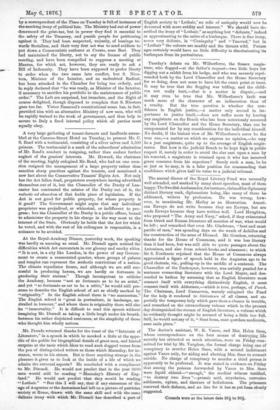The annual dinner of the Royal Literary Fund was unusually
well attended, and marked by many short speeches, most of them happy. The Swedish Ambassador, for instance, claimed for diplomacy distinct literary rank, diplomatists being, like many of those he addressed, writers by profession. He was wrong, how- ever, in mentioning Mr. Motley as an illustration. Ameri- can Envoys do not write because they are Envoys, but are made Envoys because they have written well. Lord Houghton, who proposed " The Army and Navy," asked, if they eviscerated from Greek and Roman literature all mention of war, what would be left ; and remarked that even Mr. Gladstone, "best and most pacific of men," was spending days ou the wrath of Achilles and the construction of the arms of Diomed. Mr. Goschen, returning thanks for the House of Commons, said it was less literary than it had been, but was still able to quote passages about the Antonines, and also from school-books and almanacs ; to which Sir S. Northcote rejoined that the House of Commons always appreciated a figure of speech held in the Augustan age to be good rhetoric, viz., pulling-up in the middle of a sentence. The Chancellor of the Exchequer, however, was awfully puzzled for a sentence connecting literature with the Lord Mayor, and des- cended to bathos by assuming that as English literature must connect itself with everything distinctively English, it must connect itself with Aldermen,—which is true, perhaps, of Punch. The Chairman, Lord Carnarvon, warmly eulogised the Fund for the help it rendered to litierateura of all classes, and es- pecially the temporary help which gave them a chance in trouble, and remarked on the extraordinary volume which in the present day distinguished the stream of English literature, a volume which he evidently thought might be accused of being a little too fall. Still, he would not say of it, " Sunt bona, aunt quiedam mediocria, aunt mala plura."


































 Previous page
Previous page